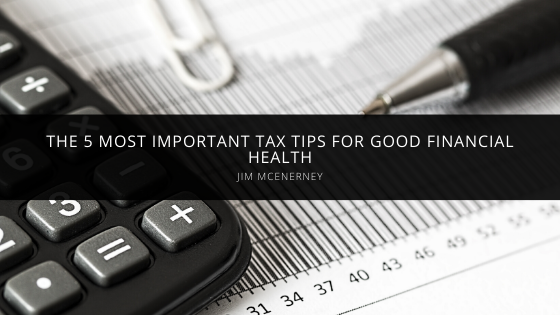By now, you’ve probably broken one or more of your New Year’s resolutions. College kids have gone back to school – and many have already started counting down to spring break. Guacamole Day is almost upon us – and, oh yeah, there’s some kind of football game happening that evening, isn’t there? Unfortunately, it’s also that time of year when you need to start thinking about your taxes.
We asked Jim McEnerney, financial advisor extraordinaire, to give us some of his top tax-related tips to help you survive the season with as little stress – and as much money staying in your pocket – as possible.
1. Don’t Not File
Most folks who expect to get a check from the government probably don’t delay filing their taxes. But those who aren’t sure how last year’s finances will shake out, or who know they’re going to owe Uncle Sam, might be tempted to stick their head in the sand until tax season is over.
Jim McEnerney cautions that filing your taxes and paying your taxes aren’t the same. Legally, you have to file a tax return. You could face civil and even criminal charges if you do not. Even if you do not have the money to pay those taxes, it’s imperative to file anyway.
In most cases, the government will work out an arrangement with you, usually by granting an extension. So there’s really no reason to risk the consequences of not filing.
2. Report All of Your Income
Here’s another area, Jim McEnerney says, where people sometimes think they can fudge the numbers or “forget” about some of their taxable income. McEnerney cautions you not to make that mistake. Remember that employers, financial institutions, and any entity that you’ve done business with during the previous fiscal year are required to provide both you and the IRS with proper documentation. So unless you were paid under the table (which is against the law, of course), there’s a record of all wages, payments, and other monies that you have received. That means Uncle Sam will know about it. (Somewhat like Santa, he sees you when you’re earning; he knows when you’re employed.) Eventually, the IRS will catch up with your undeclared income, and you’ll have to pay the taxes – as well as a penalty.
Neglecting to report income could result in criminal charges such as willful evasion of tax or failure to supply information, among others.
3. Be Smart About Deductions
There are two kinds of people in the world when it comes to deductions: those who scour their records looking for ways to get a leg up each April, and those who are content to take the standard deduction because they don’t think that investigational effort will be worth the payoff. Jim McEnerney encourages his clients – and you – to become the first type of person. You may discover that a little detective work will yield some very pleasant surprises.
Technically, there is a third category, and these folks might the smartest of all. They’re the ones who hire a financial advisor or tax preparer to scour their records for them – it’s the best of both worlds. These experienced professionals can also tip you off to little-known deductions that might apply to your situation.
4. Get Tax Credit Where Tax Credit’s Due
Deductions are used to reduce the amount of income that you can be taxed on, while tax credits directly offset the amount you owe. Dollar for dollar, they are therefore more valuable.
In addition to tax credits for dependents, there are also credits for adoption expenses, energy-saving appliances, some health care costs, saving money for retirement, and even hiring military veterans.
5. Maximize Expenses Whenever Possible
If you operate a non-incorporated business, remember to maximize your business deductions. Jim McEnerny advises that some of the expenses that you can claim include:
- Wages and benefits paid to others
- Rent and utilities
- Products purchased for resale
- Cars or vans used for the business
- Office furniture
- Computers and associated costs
- Office supplies
- There’s No Need to Dread Tax Season
Unfortunately, Jim McEnerney explains, far too many people consider tax preparation to be a chore at best, and a traumatic experience at worst. For that reason, they tend to speed through the process as quickly as they can, simply to get it all over and done with.
But it doesn’t have to be that way. If you slow down and approach the task carefully and systematically – or if you rely on the services of a professional – this transaction with the government can be made much more manageable and even lucrative!


